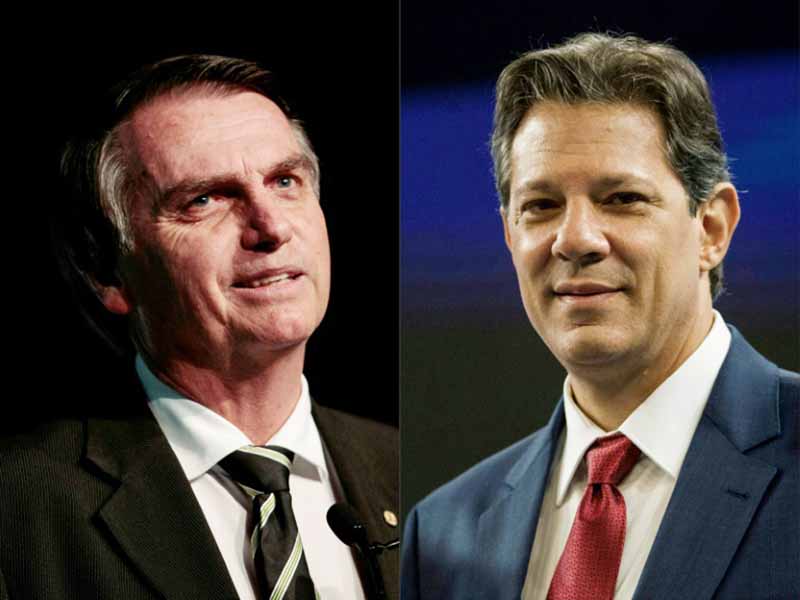
AFP, Sao Paulo :
Allegations of a dirty tricks campaign on WhatsApp dominated Brazil’s presidential election race on Thursday, turning attention to social media manipulation following abuses uncovered in the US election and Britain’s Brexit referendum two years ago.
Trailing leftist candidate Fernando Haddad accused the far-right frontrunner, Jair Bolsonaro, of “illegal” electoral tactics after a report that companies were poised to unleash a flood of WhatsApp messages attacking him and his Workers Party.
Bolsonaro denied the allegation, tweeting that the Haddad’s Workers Party “isn’t being hurt by fake news, but by the TRUTH.”
The exchange happened 10 days before a run-off election that polls predict Bolsonaro – a bluff, internet-savvy, pro-gun polemicist often compared to US President Donald Trump – will likely win comfortably.
Ordinary Brazilians told AFP that some in their families or entourage swallowed some misinformation from WhatsApp – but denied they themselves were being influenced. “We get a lot of news, even false news, but some true, about politics but I don’t think it changes very much in terms of making decisions,” said Ana Clara Valle, a 27-year-old engineer in Rio.
She said she was voting for Bolsonaro because of his Catholic, pro-family stance, not because of any “extreme right” sensibility. Andre de Souza, a 35-year-old lawyer leaning toward voting for Bolsonaro, said he receives around 500 WhatsApp messages a day for and against both candidates. The rumors and false information “don’t make a difference to me,” he said, but added: “My mother received a WhatsApp message saying Bolsonaro was doing away with (mandatory) end-of-year salary payments, and she believed it!”
There are 120 million WhatsApp user accounts in Brazil, whose population is 210 million. The app is a wildly popular communication tool between friends, families and work colleagues, outstripping even Facebook – which owns WhatsApp – in usage.
·Haddad made his accusation after Brazil’s widest circulation newspaper, Folha de Sao Paulo, reported it had discovered contracts worth up to $3.2 million each for companies to send out bulk WhatsApp messages attacking the “We have identified a campaign of slander and defamation via WhatsApp and, given the mass of messages, we know that there was dirty money behind it, because it wasn’t registered with the Supreme Electoral Tribunal,” Haddad told a media conference in Sao Paulo.
Bolsonaro’s lawyer, Tiago Ayres, told the financial daily Valor there was no evidence of any connection between the companies mentioned by Folha de Sao Paulo and Bolsonaro’s campaign.
The row shone a light on an issue that has become a pressing one in democracies: the organized abuse of social media to sway public opinion in countries.
Facebook is the most prominent company that has come under scrutiny, though Twitter has also come in for criticism.
The platforms have made an effort to clean up who uses their services after evidence of Russian interference in the 2016 US election that saw Trump triumph, and accusations Facebook allowed user data to be harvested to bolster the campaign the same year for Britain to leave the European Union.
Facebook has also shut down disinformation pages traced to campaigns believed to have ties to Iran’s state-owned media and to Russian military intelligence services.
· ‘Society needs to respond’ –
There is no evidence of foreign interference online in Brazil’s election.
However the director of major polling firm Datafolha, Mauro Paulinho, said on Twitter that his company had detected “some shifts” in public opinion just before the first round of the election on October 7, which Bolsonaro won handily.
Sergio Amadeu, a member of the Brazilian Internet Steering Committee created by the government, said it was up to electoral authorities to determine if any laws were being broken.
But he said there was “a disinformation campaign very similar and more sophisticated than the one in the US… because it was carried out within the framework of Brazilian political culture.”
An editor with the collaborative fact-checking organization Comprova, Sergio Ludtke, said public awareness and long-term education was needed to counter disinformation delivered via social media.
He added that “I consider it a mistake to think that the problem of disinformation will stop when the elections are over. These mechanisms are causing more damage each time, and society needs to respond.”

